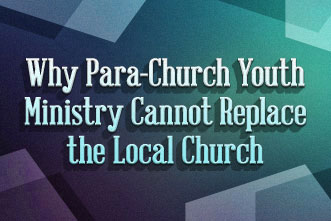In this week’s Face Off, we have contrasting opinions on the role of para-church ministries as compared to the local church.
I benefited from several para-church groups as a teenager, and I’m grateful for the men and women who serve as leaders and volunteers of those groups for the sake of Christ and his kingdom.
Over the years, however, I have become increasingly aware of my generation’s low-committal, take-it-or-leave-it approach to the local church and have wondered about the actual biblical basis for many of these para-church groups that functionally usurp the ministry, worship and fellowship of the local church.
While a para-church youth ministry might have its place—and the perceived failure of the local church in reaching teenagers is not a justifying reason—the fact remains that those para-church ministries that do not intentionally and functionally come alongside the local church find little to no foundational support from Scripture.
They are simply not the God-ordained, God-established institution here on earth called to equip the saints for the work of ministry (Eph. 3:12), the pillar and buttress of truth (1 Tim. 3:15), the bride and body of Christ (Eph. 5:23-27; Rom. 12:5), of which God has given overseers (Acts 20:28) and directives on worship and ministry (1 Cor. 14:26-40).
Some para-church organizations and ministries are great and serve a specific purpose.
I’m thinking specifically about collaborative ventures such as The Gospel Coalition, Together for the Gospel, Rooted, or efforts to pull combined resources for larger targeted projects. While many like these have legitimate goals, I’m specifically targeting those para-church youth organizations that supplant or usurp the weekly ministry of the local church and its ministry with youth.
Functionally, they end up serving as a “replacement” for the ministry of the church.
Although many para-church ministries will often vocally support the local church, I would venture to say (from my experience over the years) that many are content to let their ministry practically replace the church.
We shouldn’t get caught up in the false dichotomy between the church as institution and the church as people. Both are biblical, integrated and are two sides of the same coin.
In an age when teenagers are strapped for time—due to sports, clubs, homework and friends—why steal more of their time for a ministry that fails in comparison to the local church? Why not come alongside the local church, really and truly, to support what the para-church cannot?
I want to give you six biblical areas that many para-church youth ministries do not practice, and, thus, they should not (and cannot) serve as a replacement for the local church:
1. Weekly preaching in Lord’s Day (Sunday) worship.
Yes, para-church groups have teaching and discipleship times, but they don’t have the body of Christ meeting together to hear the Word preached in corporate Lord’s Day worship.
From creation, God has set aside one day in seven for holy rest. The fall (Gen. 3) didn’t abrogate the idea of Sabbath worship. It has continued and now commemorates the triumph of Christ’s victory over death as an ongoing one-in-seven worshipful rest.












